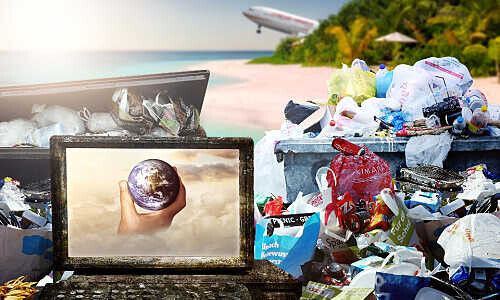A conference in Zurich shows that significant money flows have had an impact, but that the current crisis will be the industry's first real test.
By 2030, the 25 largest European and American banks will have invested roughly $13 trillion in sustainable investment products, according to consultancy Alvarez & Marsal (the original figure provided is in euros but both currencies trade near parity). That is quite something. The number makes up 37 percent of all their balance sheets combined and 15 percent of global GDP.
At the same time, most banks surveyed agreed to stop financing coal in EU and OECD countries by 2030 and end all such financing worldwide by 2040.
Facts and Ethics
At first glance, the trend toward sustainable investment in banking seems to have extreme momentum. But under the microscope, it is unclear whether the sums invested are simply put into products with solid returns that have some kind of ad hoc sustainability label superimposed on them, or whether they are so-called impact investments for the common good.
Those were the kinds of questions being posed at the «How Finance Enables Positive Change» conference held by the Swiss Finance Institute (SFI) and Swiss Sustainable Finance (SSF) this past Thursday at Zurich's Lake Side restaurant. Financial expert Alexander Wagner led the at times emotional debate by relaying interesting facts. The SFI professor made it clear in reference to his own analysis that the current crisis would be the first real test for the industry.
Less Diversified
One of the key weaknesses of ESG portfolios is that they are not optimally diversified. That means that they have relatively high levels of risk. That became clear, Wagner indicates, in the first half of 2022. ESG investments missed the rally in energy shares and sustained losses as they were overweight in tech, which fell sharply.
But the criticism can be even more fundamental than that. In a special report, the «Economist» called the ESG investment approach broken, saying it needed to be «streamlined and stripped of sanctimoniousness».
Self-Perpetuating
Indeed, it is dangerous to believe that the boom in ESG investments will automatically finance the shift to a more sustainable economy. A few banks do offer greener companies access to cheaper financing, but other banks are still providing traditional businesses attractive solutions.
Beyond that, Wagner indicates that the current ESG methodology is not enough to identify adequate targets, those that have the ability to withstand all types of problems they may encounter. Some studies show that many investors trusted companies with high ESG ratings at the beginning of the pandemic. But those high scores had no influence during the global equity correction that followed the start of the Ukraine war, as Wagner pointed out.
Greenflation
Inflation is another contentious aspect. The shift to a greener economy can lead to higher inflation, or greenflation, as it is called. That becomes a problem when inflation is already rising due to higher fossil fuel prices. When that happens, the weaker portions of the population are hit the worst, requiring difficult political decisions.
Still, sustainable finance is not like some dangerous placebo that is slowing the shift to more climate friendly policies. To the contrary, if governments fail in relation to climate policy, the ESG financial market puts visible pressure on them to change, a number of studies pointed out by Wagner indicated.



































